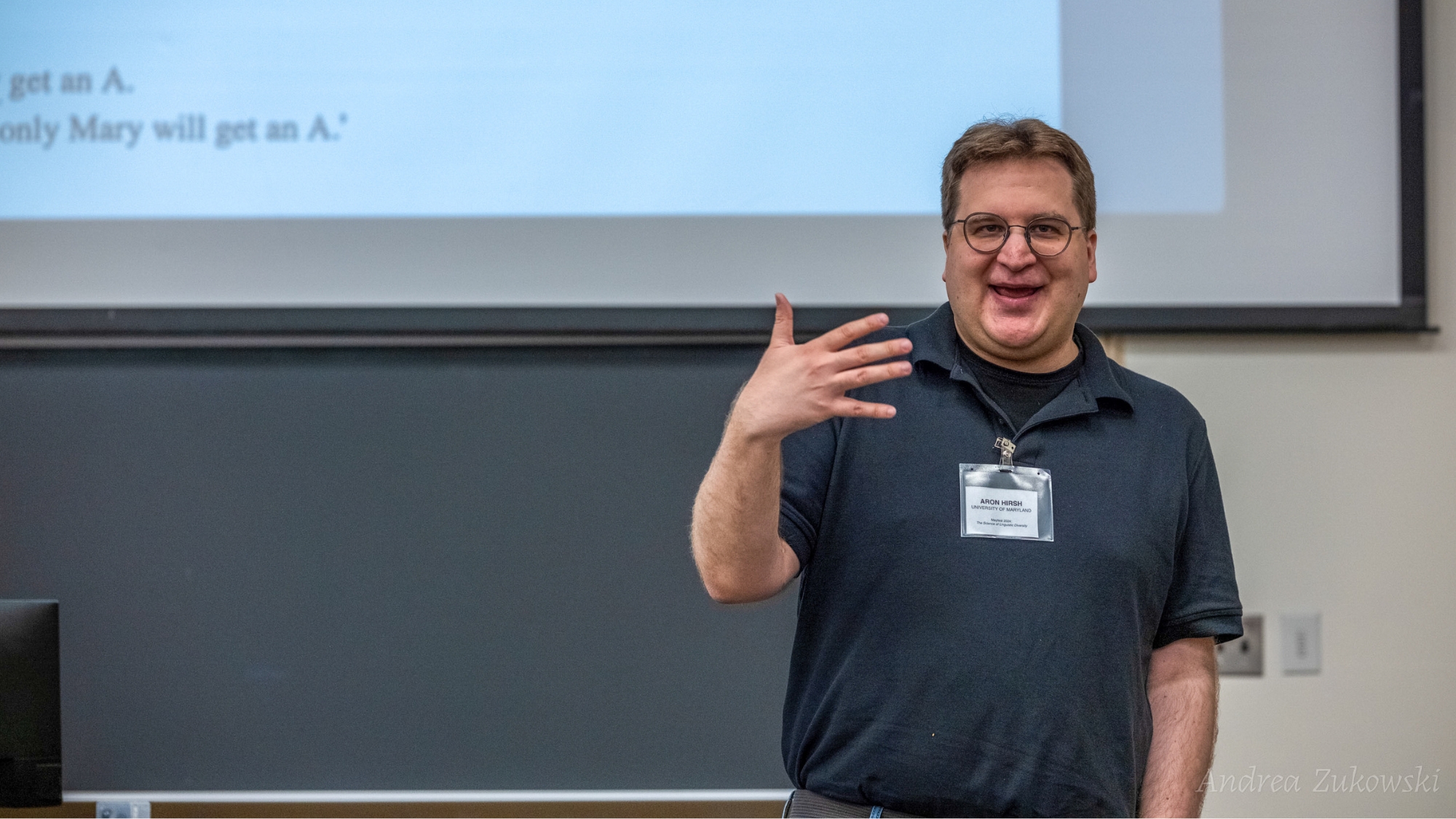Faculty Spotlight: Aron Hirsch (LING)
September 05, 2024

Assistant Professor Aron Hirsch brings enthusiasm and unique research interests to UMD's language science community.
Aron Hirsch joined the University of Maryland's Department of Linguistics as an Assistant Professor in the Fall of 2023, bringing his unique research interests in syntax and semantics, and his enthusiasm for UMD's distinctly interdisciplinary language science community.
According to MLSC Director Yi Ting Huang, the feeling is mutual: "We really value Aron’s deep curiosity about wide ranging topics and willingness to engage in discussion to build rigorous connections between theoretical linguistics, philosophy, and psychology."
Hirsch began his academic journey as a French Literature major but quickly realized that he had more interest in how language worked, rather than the language itself. After working through a linguistics book in his free time, Hirsch switched majors, earning his BA in Linguistics at McGill University and PhD in Linguistics at MIT.
Since then, Hirsch has done postdocs at McGill, the Hebrew University of Jerusalem, and the Center for General Linguistics at Leibniz-Zentrum Allgemeine Sprachwissenschaft (ZAS) in Berlin, Germany. Hirsch's background reflects his enthusiasm for linguistics, community, collaboration, and new perspectives. To Hirsch, it’s “fun” to go to a broad set of places and get to know people across the field and the world.
Hirsch's research focuses on syntax, semantics, and how we understand complex sentences. Particularly, his work explores cases where syntax and semantics conflict. In his 2017 PhD dissertation, "An inflexible semantics for cross-categorical operators," Hirsch works to provide a consistent meaning for "only" and "and" despite the diverse environments they inhabit.
For most words, their location in the sentence structure (syntax) clearly reflects their meaning (semantics). For example:
John read exactly one book.
*John exactly read one book.
Because of its meaning, ‘exactly’ is only acceptable in a certain location, before ‘one.’ (The asterisk means that the second example is grammatically unacceptable.) By contrast, words like ‘only’ can appear in different positions in the sentence without changing the meaning. For example:
John only read one book.
John read only one book.
One way this could work is that ‘only’ has multiple meanings, so that it can combine with either noun phrases (‘one book’) or verb phrases (‘read one book’). In his dissertation, Hirsch argued for another possibility: that ‘only’ has one meaning, and that sentences like these have a different syntax than they appear to from the word order.
Hirsch's theoretical work in syntax and semantics is consistently informed by other fields. He describes his work as "interdisciplinary in a number of directions," overlapping with psychology, philosophy, and cognitive science. Some of his past work has explored syntax and semantics in real-time processing, and interactions between intonation, structure, and meaning.
Hirsch embraces the interdisciplinary nature of his work and the importance of community in language science. Interactions with academics and researchers have been highlights of his journey. Hirsch spoke highly of the Hebrew University of Jerusalem's interesting set of linguists, his positive experiences co-teaching alongside academics in philosophy, and his involvement in the Language, Logic, and Cognition Center. After traveling to Leibniz-Zentrum Allgemeine Sprachwissenschaft (ZAS) in the Fall of 2020, the gradual loosening of COVID restrictions was another highlight of Hirsch's experience, allowing him to participate in the "great community" ZAS has to offer.
When asked about what brought him to UMD and highlights of his experience, Hirsch expressed strong gratitude for UMD's language science community, saying that "Coming here was a major stroke of luck."
Hirsch describes the interdisciplinary community as a major perk of UMD, underscoring its “shared goal of trying to understand language and how the mind allows us to produce and understand language”
"It's an extremely vibrant community with great colleagues and students" that teach him something new with every interaction.
In Hirsch's words, "...constant conversations between faculty and faculty, and [faculty and] students makes us think more deeply about the problems we are working on" and “leads to a much deeper understanding than I could have gotten on my own.” Hirsch is “definitely” open to and enthusiastic about interdisciplinary collaborations at UMD, that open up new possibilities for research. He sees UMD as “an incredible place to be."

